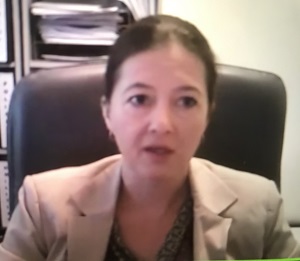Brookings Panel Debates US Policy of Going Forward in Afghanistan
By Elaine Pasquini

Washington: Thirteen months after the United States withdrew its troops from Afghanistan ending America’s longest war, Washington think tanks continue to debate the future of the Islamic Emirate vis-á-vis US policy in the region.

Bruce Riedel |

Mediha Afzal |

Vanda Felbab-Brown |

Wesley Morgan |
“What is striking to me is that a year after withdrawal we have so little American interest – or leadership – in the entire region,” said Bruce Riedel, senior fellow at Brookings Institution’s Center for Middle East Policy, on a September 12 webinar hosted by the Institution. “We at least meet with the Taliban in Doha from time to time, but we have virtually no engagement with the government of Pakistan.”
Riedel pointed out that US President Joe Biden never spoke to Imran Khan when he was prime minister. The American leader also had not spoken to Prime Minister Shehbaz Sharif until the two met informally at a reception Biden hosted in New York for world leaders on the sidelines of the UN General Assembly’s annual meeting. “I would hope the administration would seize this opportunity in order to begin a high-level dialogue with Islamabad,” Riedel commented.
He went on to note that Biden calls himself a “climate believer” and wants to do something about it, “yet we’re having very little engagement with Pakistan” at a moment when the country is undergoing a climate disaster of unprecedented proportions. “This is really baffling,” he said. “Why aren’t we engaging with the Pakistani government, not just on climate change, but on the whole question of Afghanistan? We can’t deal with the question of Afghanistan without engaging at the highest level with the government of Pakistan over a sustained period of time.”
Not dealing with Pakistan – not just on Afghanistan, but on virtually every issue in the region “is a strategic blunder that I think is quite unfortunate and which will, sooner or later, have very serious consequences,” Riedel warned.
With respect to any future involvement of the US military in Asia, Riedel noted: “This is not something that is easy, and this is not something that we have done well. From Vietnam to Afghanistan this has been a legacy of failure. Let’s not engage in any more out-of-area missions with large ground forces on the Asian or African continents.”
Brookings fellow Mediha Afzal pointed out Afghanistan essentially has a non-functioning economy due in part to the withdrawal of the US military and the sanctions Washington imposed upon the Taliban. Humanitarian aid has dried up and the country’s bank reserves are frozen. “This has precipitated a humanitarian disaster that was already in the works because of a drought,” she said. “But at this point 19 million Afghans – half of the population – face food insecurity. There are millions of malnourished children and hunger essentially all around in Afghanistan.” The United States remains the leading donor of humanitarian aid to the Afghan people, having provided more than $774 million over the last 12 months.
Vanda Felbab-Brown, a senior fellow and director of the Brookings Institution’s Initiative on Nonstate Armed Actors, discussed how sanctions imposed on the Taliban government have created “a tremendous legal bind” which is limiting how aid can be delivered to the country. “There is humanitarian aid coming in and this aid needs to go around the Taliban,” she explained. “There are NGOs on the ground who are doing a really harrowing job of working under the rules of engagement under which they can operate.”
Now back in office, the Taliban insurgency has been alive for years and has defeated major superpowers, Felbab-Brown continued. While the group is “the same brutal regime they were in the 1990s… they have mediated in local disputes…and provided the capacity for local communities to move on with their lives within a system of rules that are clear.”
One reason they have been so effective, she contended, is that they delivered governance that despite its horrors was often more tolerable for local communities. Second, they could calibrate their brutality in response to pushback from local communities. Some local governments have engaged with the Taliban, forcing the group to loosen the reins in some instances.
Wesley Morgan, a journalist and author of The Hardest Place: The American Military Adrift in Afghanistan’s Pech Valley, recalled his experiences in reporting from eastern Afghanistan where the US Army was focused on defeating the Taliban insurgency.
“Training, advising and building up the Afghan military was always very much in the backseat,” he said. “At every step along the way building up the Afghan forces is kind of an afterthought.”
The Afghan army is crippled by the years that it spent as “just an auxiliary force to this large US conventional presence,” Morgan argued. “The Afghan army has been built in a sense not to fight on its own but to fight as auxiliaries for a US and international presence that is completely reliant on airpower and has very expensive and sophisticated logistic systems so, when Afghan forces are left on their own, they are not able to cut it. They have been built to require systems they will never have.”
According to Morgan, the US leaned far too heavily on building an army in its own image. “The US military focused very heavily in Afghanistan on creating a constellation of elite special operations units that in many ways sucked away talent and resources from the larger conventional force making it brittle and susceptible to the kind of collapse that we saw…last year,” he explained. “You see this tendency almost everywhere the United States is engaged in security assistance and advising.”
(Elaine Pasquini is a freelance journalist. Her reports appear in the Washington Report on Middle East Affairs and Nuze.Ink.)

